
Home Chefs Required – new
Are you in Food Business ? Are you dealing in Homemade Food Items ??
Swayamsiddha Foundation, Mumbai, has created a marketing platform for Women Entrepreneurs dealing in homemade food products. The Initiative is called “The Food Station”. You can sell your food products through our portal.
Requirement :
a) Only for Women Entrepreneurs
b) Must have valid FSSAI licence
c) The product must have proper packing and labelling
For further details and to enroll on the platform, please click here

Empowering Progress: Women Shaping the Future of Business
In today’s dynamic world, women are not merely contributors but key architects of stability and prosperity within their families. While their multifaceted skills shine in various tasks, the realm of entrepreneurship has historically been dominated by men, limiting the opportunities for women to showcase their talents.
Nishtha Yogesh, the visionary Founder and CEO of Hunar Online Course, sheds light on the resilience of women, overcoming challenges such as limited access to capital and fewer opportunities for skill development. Despite these hurdles, women are redefining societal attitudes towards their role in business.
Rising Influence of Women in Business
Women entrepreneurs are increasingly making their mark, wielding significant influence across diverse sectors. Their contributions are indispensable, driving job creation, fueling economic growth, and fostering prosperity in fields ranging from education and e-commerce to healthcare and technology.
Diversity Fuels Leadership
Women are breaking barriers and securing positions of leadership within corporate realms. Their superior leadership, collaboration skills, and enhanced productivity levels contribute to a transformative shift in the workforce. Studies indicate that equal work opportunities could potentially boost India’s GDP by a substantial 18 percent by 2025.
Challenges Amid Progress
While the ascent of women in business is promising, challenges persist. Gender bias, unequal access to funding, and underrepresentation in certain industries are hurdles that demand resilience and determination. Overcoming these challenges is not only essential for breaking barriers but also crucial for fostering job creation and nation-building.
Unveiling Economic Potential
Presently, women constitute only 22 percent of India’s GDP, well below the global average of 45 percent. However, this statistic underscores the untapped economic potential that could be unlocked through enhanced representation and opportunities for women in business.
A Bright Economic Future
Despite challenges, the increasing number of women entrepreneurs and investors heralds a brighter economic future. From entrepreneurship to investment and corporate leadership, women are not just making their presence felt—they are driving positive change. Their unique perspectives, commitment to sustainability, and innovative prowess are invaluable assets benefiting society as a whole.

Entrepreneurship Workshop 2024
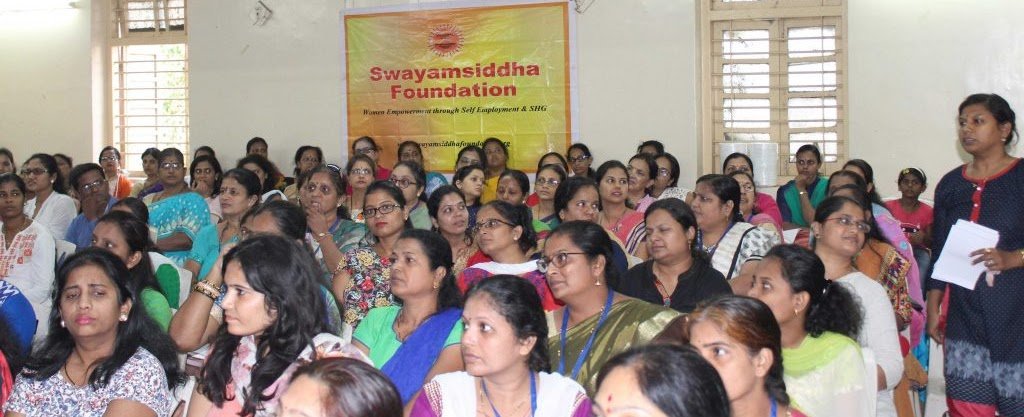
Enrollment started for Courses
Swayamsiddha Foundation, Mumbai, specializes in organizing tailor-made training programmes for women. If you are a new women entrepreneur, planning to start your own business or an existing women entrepreneur, you can join our short-term Online / Offline Training Programmes.
Please submit the form below, we will contact you when the course is scheduled.
Join our Training Whatsapp Group, where you can get updates of upcoming programmes.

Bachat Gat – Sakhi Samvaad
बचत गटात आहात ? बचत गट शिथिल झालाय ? अपेक्षित यश मिळत नाही ? सतत कुरबुरी असतात ? गटाच्या माध्यमातून व्यवसाय करायचा आहे ? गट यशस्वी करायचा आहे ?
वरील प्रश्नांची उत्तरे मिळावा
बचत गट – सखी संवाद कार्यक्रम
दिनांक : २५ नोव्हेंबर, २०२३
दुपारी : ०२.०० ते ०५.००
ठिकाण : ठाणे
विषय :
बचत गट कसा बनवावा,
गट सक्षम कसा करावा,
गटाच्या माध्यमातून व्यवसाय कसा करावा,
नोंदणी,
गटांसाठी विविध योजना,
गट यशस्वी कसा करावा
फी : रु. १००/- प्रति व्यक्ती
अधिक माहिती :
9029051434 | 8222828728
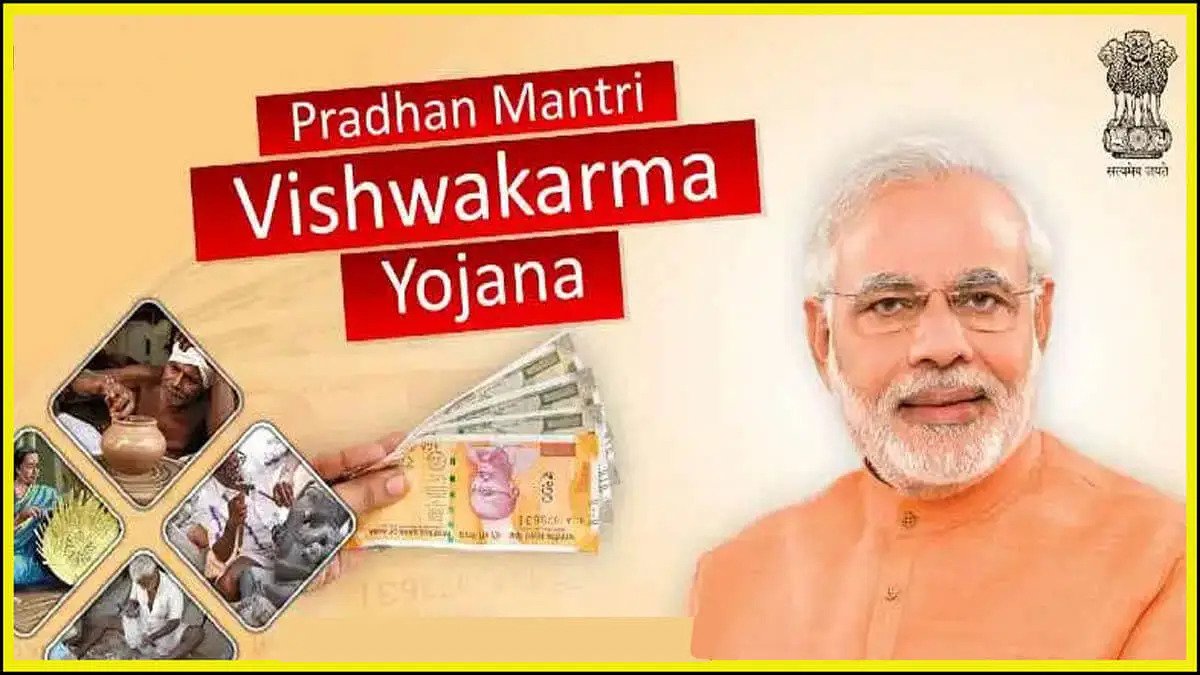
PM Vishwakarma Scheme
PM Vishwakarma, a Central Sector Scheme, was launched on 17th September, 2023 by the Prime Minister to provide end-to-end support to artisans and craftspeople who work with their hands and tools. The Scheme covers artisans and craftspeople engaged in 18 trades, viz.(i) Carpenter (Suthar/Badhai); (ii) Boat Maker; (iii) Armourer; (iv) Blacksmith (Lohar); (v) Hammer and Tool Kit Maker; (vi) Locksmith; (vii) Goldsmith (Sonar); (viii) Potter (Kumhaar); (ix) Sculptor (Moortikar, stone carver), Stone breaker; (x) Cobbler (Charmkar)/ Shoesmith/Footwear artisan; (xi) Mason (Rajmistri); (xii) Basket/Mat/Broom Maker/Coir Weaver; (xiii) Doll & Toy Maker (Traditional); (xiv) Barber (Naai); (xv) Garland maker (Malakaar); (xvi) Washerman (Dhobi); (xvii) Tailor (Darzi); and (xviii) Fishing Net Maker.
The Scheme envisages provisioning of the following benefits to the artisans and crafts persons:
(i) Recognition: Recognition of artisans and craftspeople through PM Vishwakarma certificate and ID card.
(ii) Skill Upgradation: Basic Training of 5-7 days and Advanced Training of 15 days or more, with a stipend of Rs. 500 per day;
(iii) Toolkit Incentive: A toolkit incentive of upto Rs. 15,000 in the form of e-vouchers at the beginning of Basic Skill Training.
(iv) Credit Support: Collateral free ‘Enterprise Development Loans’ of upto Rs. 3 lakh in two tranches of Rs. 1 lakh and Rs. 2 lakh with tenures of 18 months and 30 months, respectively, at a concessional rate of interest fixed at 5%, with Government of India subvention to the extent of 8%. Beneficiaries who have completed Basic Training will be eligible to avail the first tranche of credit support of upto Rs. 1 lakh. The second loan tranche will be available to beneficiaries who have availed the 1st tranche and maintained a standard loan account and have adopted digital transactions in their business or have undergone Advanced Training.
(v) Incentive for Digital Transaction: An amount of Re. 1 per digital transaction, upto maximum 100 transactions monthly will be credited to the beneficiary’s account for each digital pay-out or receipt.
(vi) Marketing Support: Marketing support will be provided to the artisans and craftspeople in the form of quality certification, branding, onboarding on e-commerce platforms such as GeM, advertising, publicity and other marketing activities to improve linkage to value chain.
In addition to the above-mentioned benefits, the Scheme will onboard the beneficiaries on Udyam Assist Platform as ‘entrepreneurs’ in the formal MSME ecosystem.
Enrolment of beneficiaries shall be done through Common Service Centres with Aadhaar-based biometric authentication on PM Vishwakarma portal. The enrolment of beneficiaries will be followed by a three-step verification which will include (i) Verification at Gram Panchayat/ ULB level, (ii) Vetting and Recommendation by the District Implementation Committee (iii) Approval by the Screening Committee.
For more information, the Guidelines of PM Vishwakarma can be accessed at pmvishwakarma.gov.in. For any queries, artisans and craftspeople may call at 18002677777 or email at pm-vishwakarma@dcmsme.gov.in.
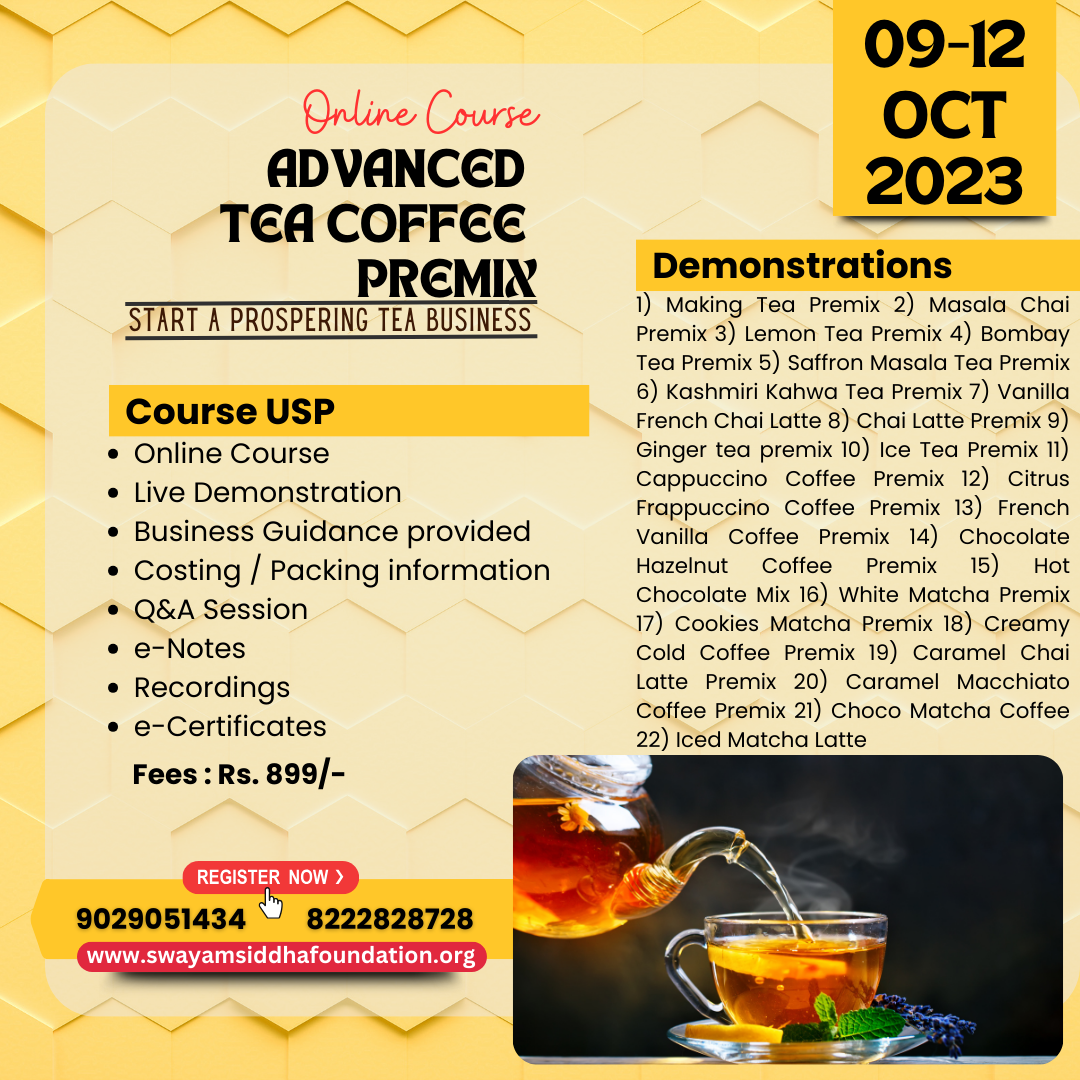
Advanced Tea & Coffee Premix Course
Tea Business is a flourishing business. Learn to make tea in a professional manner and delve into the business.
Date : 09 to 12 Oct.,2023 | 02.00 pm to 03.00 pm
Mode : Online
Language : Marathi
Fee : Rs.899/-
Course Content : 1) Making Tea Premix 2) Masala Chai Premix 3) Lemon Tea Premix 4) Bombay Tea Premix 5) Saffron Masala Tea Premix 6) Kashmiri Kahwa Tea Premix 7) Vanilla French Chai Latte 8) Chai Latte Premix 9) Ginger tea premix 10) Ice Tea Premix 11) Cappuccino Coffee Premix 12) Citrus Frappuccino Coffee Premix 13) French Vanilla Coffee Premix 14) Chocolate Hazelnut Coffee Premix 15) Hot Chocolate Mix 16) White Matcha Premix 17) Cookies Matcha Premix 18) Creamy Cold Coffee Premix 19) Caramel Chai Latte Premix 20) Caramel Macchiato Coffee Premix 21) Choco Matcha Coffee 22) Iced Matcha Latte
(Course Fee includes : Theory, Demonstration, e-notes, e-certificates, business inputs, costing and other support services of Swayamsiddha Foundation)
For further details : 9029051434 / 8222828728
.
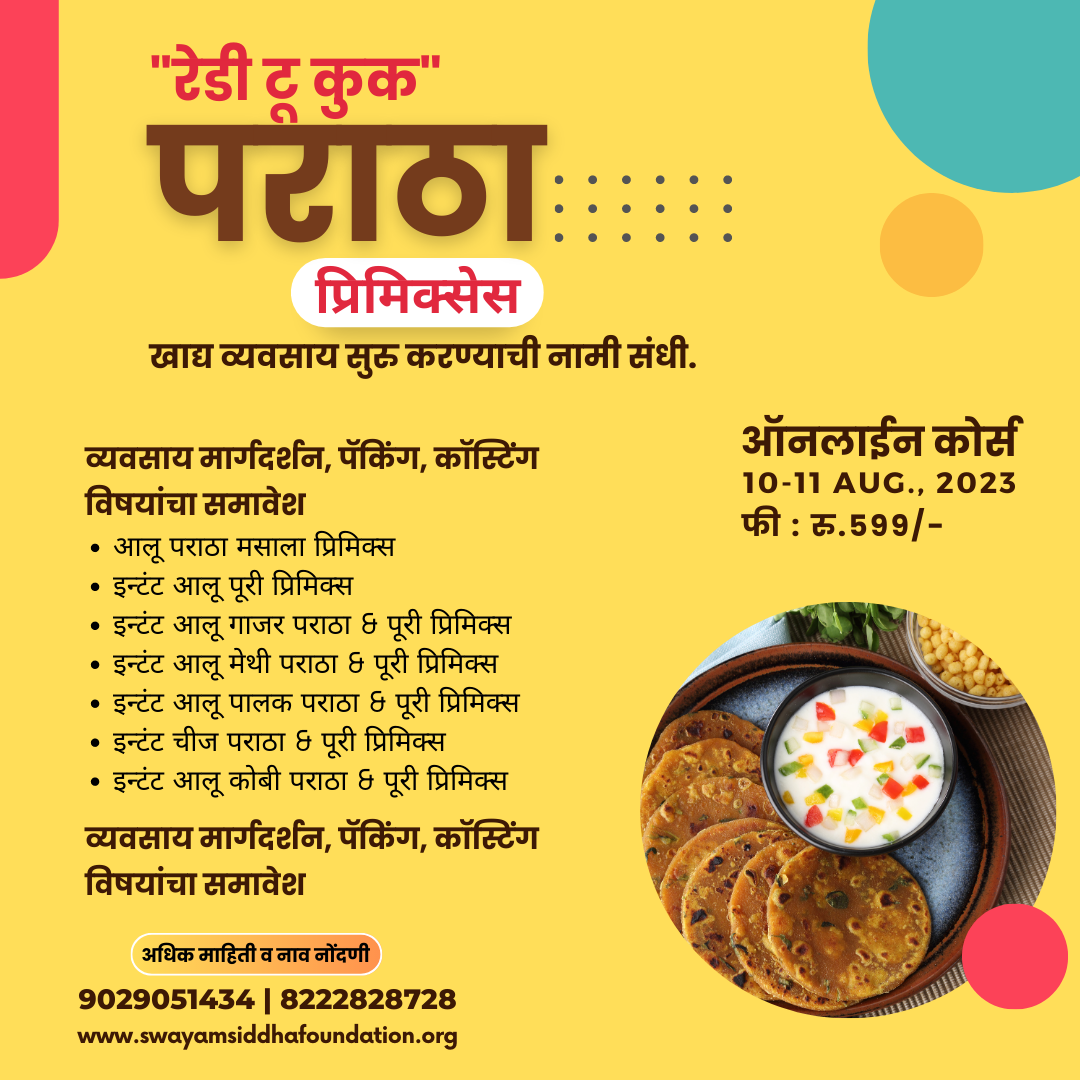
Ready to Cook Paratha Premix
Love Parathas? Do not miss our ready to cook Paratha premix course. Idea for Foodies, Housewives and those interested in Food Business.
Date : 10-11 Aug.,2023
Mode : Online
Language : Marathi
Fee : Rs.599/- all inclusive.
(Course Fee includes : Theory, Demonstration, e-notes, e-certificates, business inputs, costing and other support services of Swayamsiddha Foundation)
For further details : 9029051434 / 8222828728
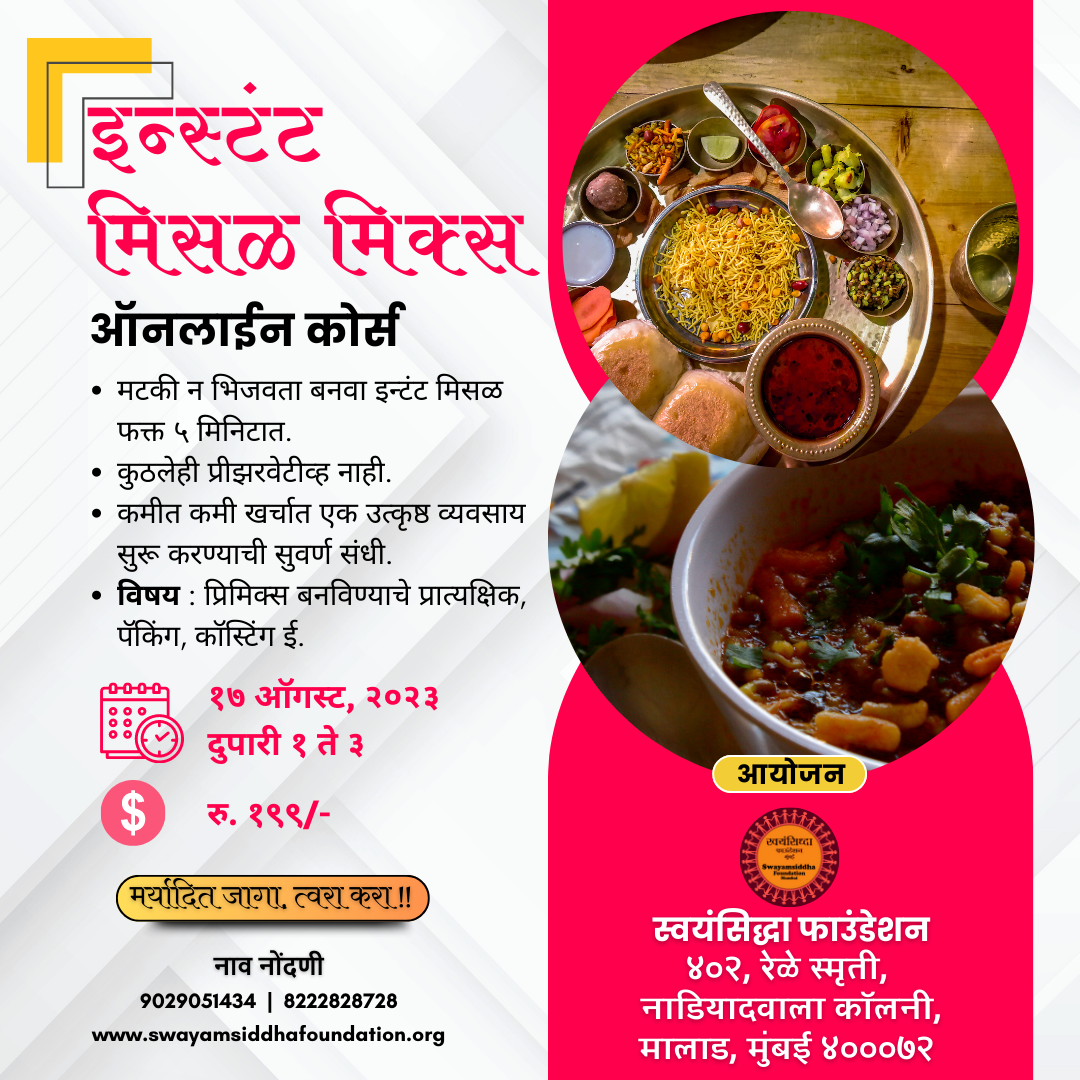
Online Instant Misal Mix Course
Learn to prepare the popular Maharashtrian recipe Misal in a new way. Instant Misal Mix Course teaches you to prepare Misal in five minutes. Great for foodies, housewives and those who plan to start fast food business.
Date : 17th Aug.,2023
Time : 01 PM to 03 PM
Mode : Zoom App
Language : Marathi
Fee : Rs.199/- all inclusive.
(Course Fee includes : Theory, Demonstration, e-notes, e-certificates, business inputs, costing and other support services of Swayamsiddha Foundation)
For further details : 9029051434 / 8222828728

Entrepreneurship Motivation Camp for Students
An Entrepreneurial Motivation Camp was organized by Laxmichand Golwala College, Ghatkopar in association with Swayamsiddha Foundation on 17th July, 2023 on the occasion of World Youth Skills Day by Laxmichand Golwala College, Ghatkopar with the aim of inculcating the roots of entrepreneurship in students.
In this program Mrs. Meghana Gawade and Mr. Dattaram Walvankar, Directors of Swayamsiddha Foundation participated. The college was represented by Dr. Sunil Karve, Principal, Teachers and Students. The main guidance was Mr. Milind Kane who spoke about the relevance of entrepreneurship and inspired them to pursue entrepreneurship.
